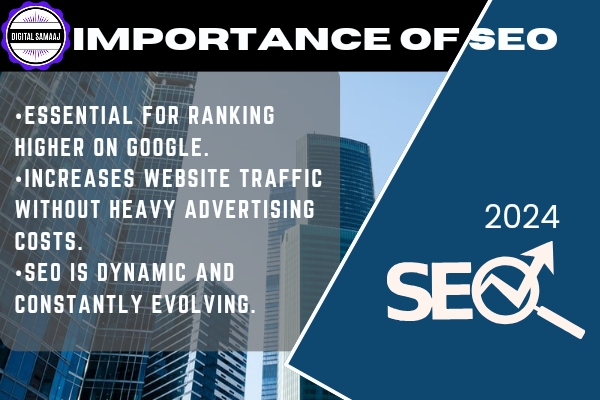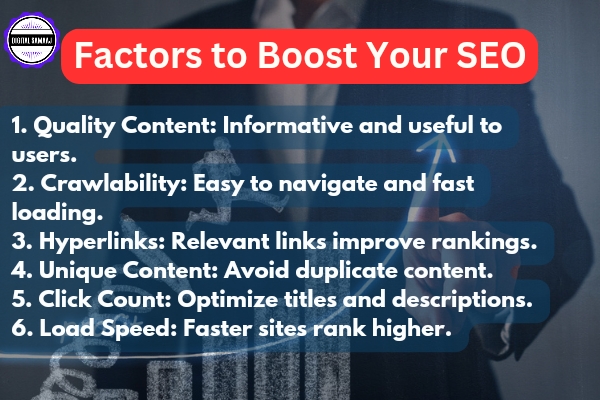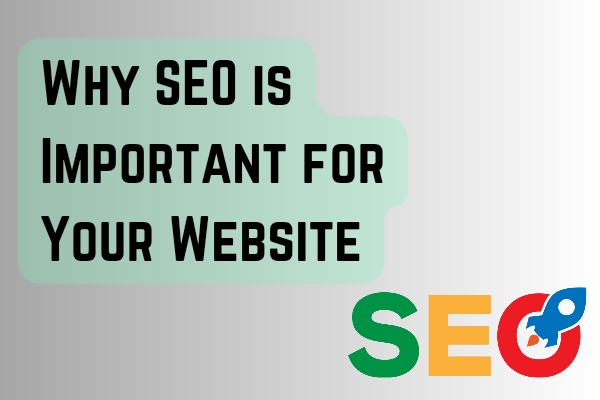In today’s digital age, everyone wants their website or blog to be the top result on Google. The question is, how can you achieve this? Let us know the importance of SEO in ranking your blog on the Search Engine Results Page (SERP). In this article, we will discuss everything you need to know about SEO to optimize your website.
Table of Contents
ToggleWhat is SEO?
Search Engine Optimization (SEO) is vital for ranking a website at the top of Google. It involves improving your website to enhance its visibility when people search for products or services related to your business on Google, Bing, and other search engines. Better visibility in search results means more attention and attracts prospective and existing customers to your business.
Importance of SEO
SEO is an essential factor for attracting more attention to your website without spending heavily on advertisements. It is a dynamic and ever-changing field where nothing stays constant for long, making it a bit challenging to master.

Understanding Search Engines
Importance of SEO involves search engines like Google, Yahoo, and Bing. These are tools that help search through vast databases to provide the results we need. Google is the most prominent search engine, used by almost everyone today. To work effectively with SEO, it’s crucial to understand the basic mechanics of search engines, which operate on three main levels: Crawling, Indexing, and Selecting Results.
- Crawling: This involves searching and scanning all available data. Search engines use crawlers to determine and trace hyperlinks and discover new data in the form of web pages.
- Indexing: Search engines organize data from numerous web pages to understand and process it. This categorization helps in analyzing the data to provide relevant results.
- Selecting Results: The final step is choosing the results that best match the user’s search query.
Google uses complex algorithms to organize its data, determining search results and rankings. These algorithms consider various aspects such as the keywords used by the user, relevance of the search results, readability, loading speed, and user context.
Factors to Boost Your SEO

To keep your website’s ranking high, consider the following factors:
- Content for Target Audience: Ensure your content is informative and useful to your users. Quality content is crucial in SEO and digital marketing.
- Website’s Crawlability: Ensure your website is easy to crawl, has a fast loading time, and is accessible.
- Hyperlinks: Relevant hyperlinks and backlinks play a significant role in improving your website’s ranking.
- Unique Content: Post unique and reliable content. Duplicate content can harm your website’s ranking.
- Click Count or Impressions: Customize your title tags and meta descriptions to increase clicks and impressions.
- Load Speed: Websites with fast loading speeds receive better rankings in SEO.
Types of SEO
SEO can be categorized into three types:
On-Page SEO:
Involves optimizing content and web pages to align with Google search results.
Off-Page SEO:
Includes activities that help improve your website’s ranking indirectly.
Local SEO:
Focuses on enhancing your business’s visibility in local search results.
On-Page SEO Tips
- Quality Content: Analyze and explore your niche to determine the best spot for your website.
- Page Loading Speed: Reduce page loading time by minimizing image sizes.
- Meta Data: Use tools like keywords, meta heads, and meta descriptions to make your content SEO-friendly.
- Consistency: Regularly update and post new content.
Off-Page SEO Tips
- Hyperlinks: Add as many relevant hyperlinks as possible.
- Blog Comments: Increase engagement and gather feedback through blog comments.
- Images and Videos: Include more photos and videos to make content more engaging.
- Guest Content: Regularly update content with guest posts to attract a combined audience.
Local SEO Tips
- Google My Business: Set up and optimize your Google My Business account.
- Google Maps: List your business on Google Maps and optimize it.
- Search Directory Listings: List your business on directories like Sulekha, Yellow Pages, JustDial, and India Mart.
Keyword Research
Keywords play a crucial role in enhancing any webpage’s SEO. Here’s a guide to help you determine the right keywords for your website:
- Research Your Target Audience: Understand your audience to determine the most suitable keywords.
- Check Relevance: Ensure your chosen keywords align with your researched target audience.
- Use Tools for Keyword Research: Utilize tools like Google Suggest, Ubersuggest, Ahrefs, and SEMRush.
- Understand Keyword Metrics and Search Volume: Focus on factors like popularity, relevance, and rank to find the best keywords.
Summary
- SEO is crucial for any website: Optimize your website to increase reach and accessibility.
- Include photos and videos: Make your website more engaging.
- Add meta descriptions and titles: Enhance readability and SEO ranking.
- Content should be relevant to your target audience: Regularly update content to maintain SEO ranking.
- Optimize content for SEO: Use keywords, subheadings, and bullet points.
- Understand Google’s algorithm: It’s vital for aligning your content with SEO principles.







